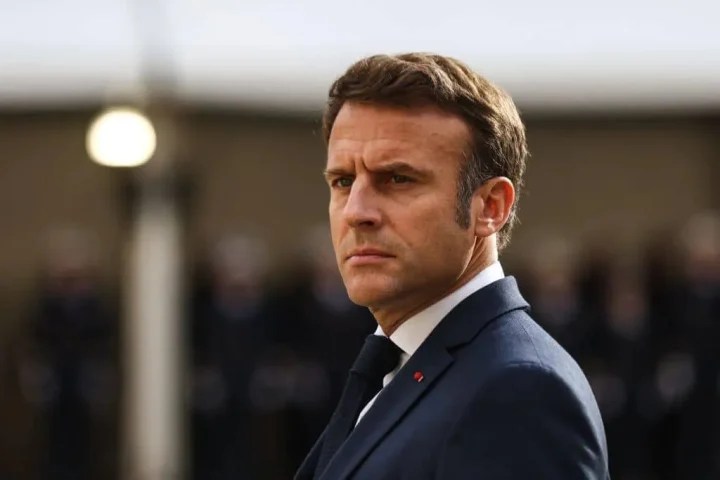A penny for the thoughts of Emmanuel Macron on Saturday when it seemed Boris Johnson might once more occupy No. 10. Hasta la Vista, baby. Oh Mon Dieu, non!
Macron’s opinion of the former PM is on record, and the French in general were aghast at the prospect of Boris back in charge. One newspaper asked its readers in an online poll if they would welcome a second dose of Johnson: of the 240,000 people who responded, three-quarters said no.
There was a time when BoJo was all the rage in France. In the summer of 2021 he was more popular than Macron – not hard, admittedly, given his unpopularity in many quarters – but eventually the French concluded that their president was right: Johnson is a clown.
The events of recent weeks have bemused the French. There has been little glee at the chaos, no Schadenfreude at the rise and rapid fall of Liz Truss. The bedlam is what they would expect from Italy, not Britain, respected for its reliable and stable governance.
The timing of Sunak’s accession to power could not be better for Macron. He needs some friends right now
France, and Macron in particular, want a prime minister with those characteristics. So there will be a sigh of relief at the Elysée that Rishi Sunak is in No. 10, the fourth PM in Macron’s five years as president, but most probably the one he’ll get on with best.
As I wrote in July, the pair have much in common in terms of politics and presentation; as Margaret Thatcher said of Mikhail Gorbachev in 1984, they ‘can do business together’.
The timing of Sunak’s accession to power could not be better for Macron. He needs some friends right now. Things are so bad that on Sunday the president informally met Giorgia Meloni, Italy’s new right-wing PM, a woman who in past speeches had made it plain she is not a fan of the French president.
Macron is the first head of state to meet Meloni and he described their tête-à-tête in Rome as ‘frank and demanding’. Among the subjects broached was the migrant crisis, a long-standing bone of contention between the countries.
Macron has another meeting on Wednesday, this one in Paris with Olaf Scholz. Sure, the president and the German chancellor will be all smiles and warm handshakes, but the truth is France and Germany are in the process of a bitter divorce. As Le Figaro said in its editorial on Monday, there is a ‘profound geostrategic shift, a long-standing continental drift that will transform the face of Europe for a long time to come.’
The war in Ukraine has shaken Germany from its complacency, economically and militarily, and the ramifications for France will be profound. Scholz’s ambition is to transform Germany into the continent’s largest and most powerful military. This will be achieved with a war chest of €100 billion (£87 billion), and the enthusiastic support of the USA from whom Germany will purchase much of its hardware. The stronger Germany is militarily, believes Washington, the stronger Nato is in Europe.
Unfortunately for France, there is no place for them in the new European order. As Le Figaro put it: ‘Berlin sees itself as the centre of a Europe considerably enlarged to the east, from the Ukraine to the Balkans. Paris would find itself relegated to the head of the ‘Club Med’ – Italy, Spain, Greece.’ Germans will continue to regard these countries as attractive holiday destinations but not heavyweight political partners.
What France is experiencing is what François Mitterrand feared in 1989. So did Margaret Thatcher, and a fascinating conversation between the pair at the fringes of the European summit in Strasbourg on 8 December 1989 was reproduced in Philip Short’s biography of the French president. Mitterrand expressed his concern that the ‘dangerous’ acceleration of German reunification would result in them dominating Europe. Thatcher agreed. ‘We must put the Germans in a framework where it’s kept under control,’ she said. The problem, added Thatcher, was Washington, who were pro-reunification because ‘there’s a strong pro-German lobby in America’. One of Mitterrand’s solutions was to ‘re-establish the entente between France and Britain, as in 1913 and 1938’.
France cannot continue to put its faith in Germany, a relationship which Le Figaro correctly describes as a ‘myth’. It was cultivated by Paris, said the newspaper, ‘to compensate for France’s decline, just as the United Kingdom seeks to mask its decline with the grand illusion of a special relationship with the United States’.
A new entente is overdue: one that strengthens cooperation on defence, energy and the problem of uncontrolled immigration, a crisis that is causing deep unrest among voters in both countries. Macron should also use his influence within the EU, while it remains, to satisfactorily conclude post-Brexit negotiations concerning the Northern Ireland protocol.
In his gracious and reverential eulogy to Queen Elizabeth last month Macron demonstrated that, contrary to what some of his critics in Britain claim, he is no Anglophobe; he was simply a Borisphobe.







Comments